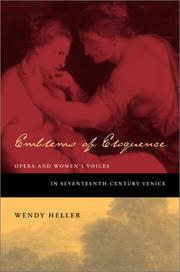| Listing 1 - 1 of 1 |
Sort by
|

ISBN: 1282356690 0520919343 9786612356698 159734592X 9780520919341 0520209338 9780520209336 9781597345927 Year: 2003 Publisher: Berkeley University of California Press
Abstract | Keywords | Export | Availability | Bookmark
 Loading...
Loading...Choose an application
- Reference Manager
- EndNote
- RefWorks (Direct export to RefWorks)
Opera developed during a time when the position of women-their rights and freedoms, their virtues and vices, and even the most basic substance of their sexuality-was constantly debated. Many of these controversies manifested themselves in the representation of the historical and mythological women whose voices were heard on the Venetian operatic stage. Drawing upon a complex web of early modern sources and ancient texts, this engaging study is the first comprehensive treatment of women, gender, and sexuality in seventeenth-century opera. Wendy Heller explores the operatic manifestations of female chastity, power, transvestism, androgyny, and desire, showing how the emerging genre was shaped by and infused with the Republic's taste for the erotic and its ambivalent attitudes toward women and sexuality. Heller begins by examining contemporary Venetian writings about gender and sexuality that influenced the development of female vocality in opera. The Venetian reception and transformation of ancient texts-by Ovid, Virgil, Tacitus, and Diodorus Siculus-form the background for her penetrating analyses of the musical and dramatic representation of five extraordinary women as presented in operas by Claudio Monteverdi, Francesco Cavalli, and their successors in Venice: Dido, queen of Carthage (Cavalli); Octavia, wife of Nero (Monteverdi); the nymph Callisto (Cavalli); Queen Semiramis of Assyria (Pietro Andrea Ziani); and Messalina, wife of Claudius (Carlo Pallavicino).
Women in opera. --- Opera --- Comic opera --- Lyric drama --- Opera, Comic --- Operas --- Drama --- Dramatic music --- Singspiel --- History and criticism --- 17th century. --- androgyny. --- antiquity. --- callisto. --- carthage. --- cavalli. --- chastity. --- classical. --- classicism. --- desire. --- dido. --- diodorus siculus. --- drama. --- empress. --- erotic. --- female characters. --- female power. --- female vocality. --- feminism. --- gender studies. --- gender. --- messalina. --- monteverdi. --- music. --- musicology. --- mythological women. --- mythology. --- nonfiction. --- nymph. --- octavia. --- opera women. --- opera. --- ovid. --- pallavicino. --- performing arts. --- purity. --- semiramis. --- sexuality. --- tacitus. --- theater. --- transvestism. --- venetian opera. --- virgil. --- women. --- womens rights. --- ziani.
| Listing 1 - 1 of 1 |
Sort by
|

 Search
Search Feedback
Feedback About UniCat
About UniCat  Help
Help News
News